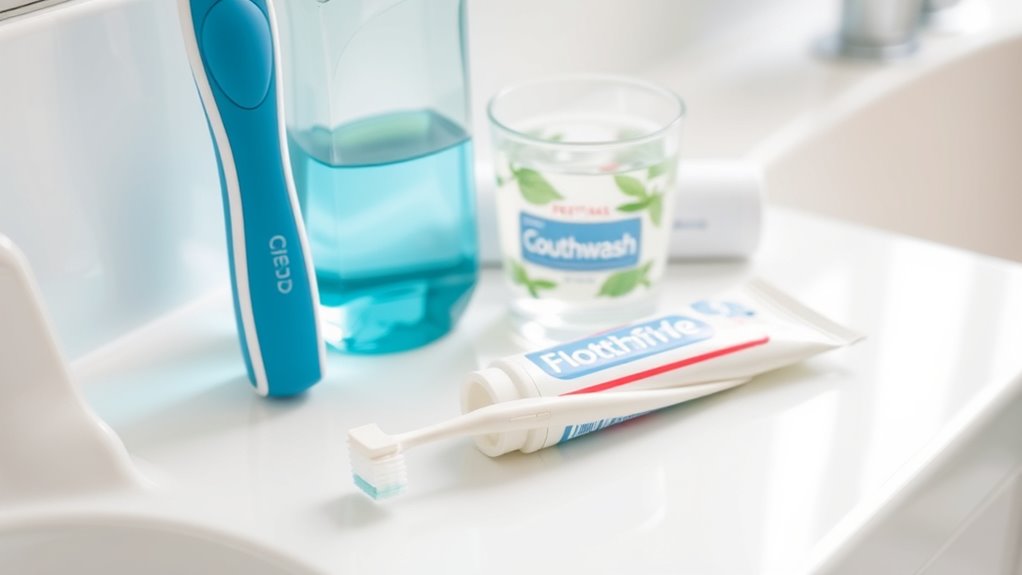After 40, maintaining good oral hygiene means choosing a soft-bristled toothbrush and using gentle circular motions for two minutes daily, along with flossing to remove plaque between teeth. Use a fluoride toothpaste suited for sensitive gums and incorporate mouthwash for extra protection. Regular dental check-ups help catch issues early. Address dry mouth and sensitivity with specialized products, and keep a healthy diet to support your smile. Keep exploring for even more tips to keep your teeth and gums healthy.
Key Takeaways
- Use soft-bristled or electric toothbrushes with gentle circular motions for effective cleaning without damaging gums.
- Floss daily to remove plaque and food debris from tight spaces, preventing gum disease and decay.
- Schedule biannual dental checkups for early detection and professional cleaning of plaque and tartar buildup.
- Choose toothpaste with natural soothing ingredients and moderate fluoride to protect sensitive, mature gums.
- Maintain a balanced diet rich in calcium, limit sugar, and incorporate mouthwash to support overall oral health.
Choosing the Right Toothbrush and Technique

Choosing the right toothbrush and technique is essential for maintaining good oral health after 40. With so many toothbrush types available—manual, electric, sonic—you’ll want to select one that suits your needs and comfort. Electric toothbrushes often provide more effective plaque removal and can be easier to handle for those with limited dexterity. When it comes to brushing techniques, gentle circular motions are key, ensuring you clean each tooth thoroughly without damaging your gums. Avoid aggressive scrubbing, which can cause gum recession. Use a soft-bristled brush to protect sensitive areas, and replace your toothbrush every three to four months. Proper headphone jack compatibility in your brushing technique can significantly improve your oral hygiene, helping to prevent issues like staining and discoloration. Additionally, understanding proper oral hygiene practices can support the health of your gums and teeth as you age. Developing a consistent routine and being mindful of dental care habits can make a substantial difference in maintaining healthy teeth and gums while reducing the risk of oral issues common after 40.
The Importance of Flossing Daily
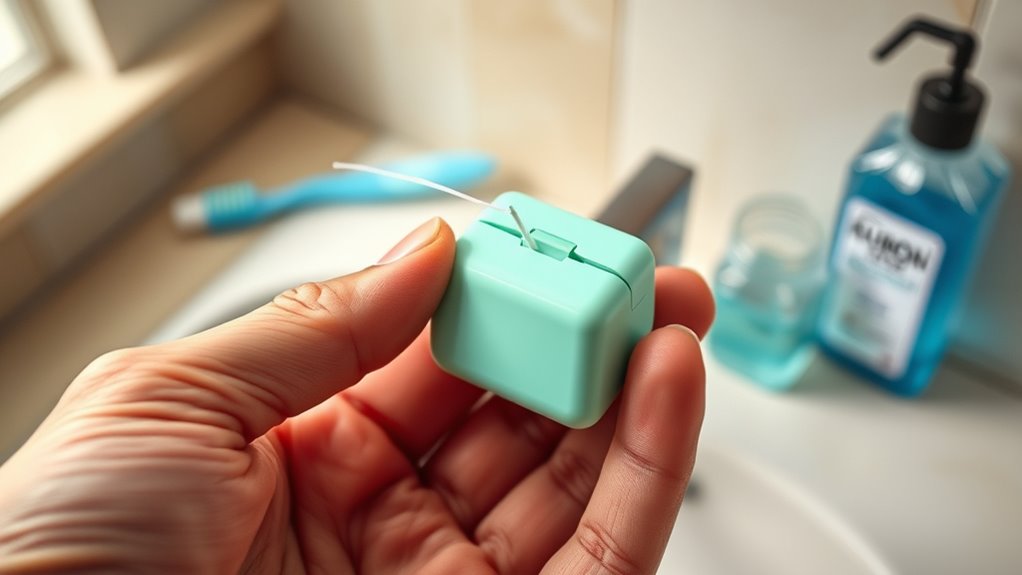
Flossing daily helps prevent gum disease and keeps your mouth healthy. It also removes hidden plaque that brushing might miss and leaves your breath feeling fresh. Making it part of your routine can considerably improve your oral health after 40.
Prevents Gum Disease
Because plaque and food particles often hide between teeth and along the gumline, daily flossing is essential in preventing gum disease. Regular flossing helps you remove debris that brushing alone can’t reach, reducing bacteria that cause inflammation. This practice is key for gingivitis prevention, as it stops early gum issues from progressing. Maintaining periodontal health depends on consistent flossing, which keeps your gums firm and reduces bleeding and swelling. When you floss daily, you lower the risk of developing more serious conditions like periodontitis, which can lead to tooth loss. Incorporating this habit into your routine strengthens your overall oral health, especially after 40, when gums may become more susceptible to disease. Proper technique and choosing the right flossing tools can enhance effectiveness. Additionally, understanding the importance of interdental cleaning highlights how vital flossing is in comprehensive oral care. Using antimicrobial mouthwash after flossing can further reduce bacteria and support healthy gums. Stay diligent with flossing to protect your smile and long-term gum health.
Removes Hidden Plaque
While brushing clears away surface plaque, it often misses debris tucked between teeth and along the gumline. That’s where hidden plaque hides, harboring oral bacteria that can cause decay and gum issues. Flossing daily is essential because it reaches these tight spaces, removing plaque that brushing alone can’t. Without flossing, this hidden plaque builds up, increasing your risk of cavities and periodontal problems. Plus, removing oral bacteria helps keep your mouth healthier overall. Make flossing a daily habit to target areas your toothbrush can’t reach. It’s a simple step that considerably reduces plaque buildup, keeps your gums healthy, and prevents future dental issues. Additionally, incorporating AI-based dental diagnostics can enhance personalized oral care routines. Understanding plaque accumulation can help tailor your oral hygiene practices more effectively. Don’t underestimate the power of flossing—it’s key to maintaining prime oral hygiene after 40.
Freshens Breath Daily
Daily flossing not only removes hidden plaque but also plays a vital role in freshening your breath. When you floss regularly, you’re clearing food particles and bacteria that cause bad odors, helping your breath stay fresh throughout the day. For extra freshness, consider herbal remedies like mint-infused floss or rinses with natural herbs known for their deodorizing properties. If you need a quick boost, breath mints are a convenient option, but they shouldn’t replace daily flossing. Proper technique in flossing ensures the removal of bacteria and debris from hard-to-reach areas, enhancing oral health. Incorporating flossing into your routine can also promote better oral hygiene, reducing the risk of gum disease and cavities. Regular flossing contributes to vital oral health, preventing the buildup of plaque and bacteria that cause bad breath from developing later. Remember, fresh breath isn’t just about masking odors—it’s about maintaining overall oral health. Incorporate flossing into your daily routine, and you’ll notice a confident, clean feeling with every smile. Using tools like eye patches can help rejuvenate tired eyes, complementing your self-care routine for overall well-being.
Selecting the Best Toothpaste for Mature Gums
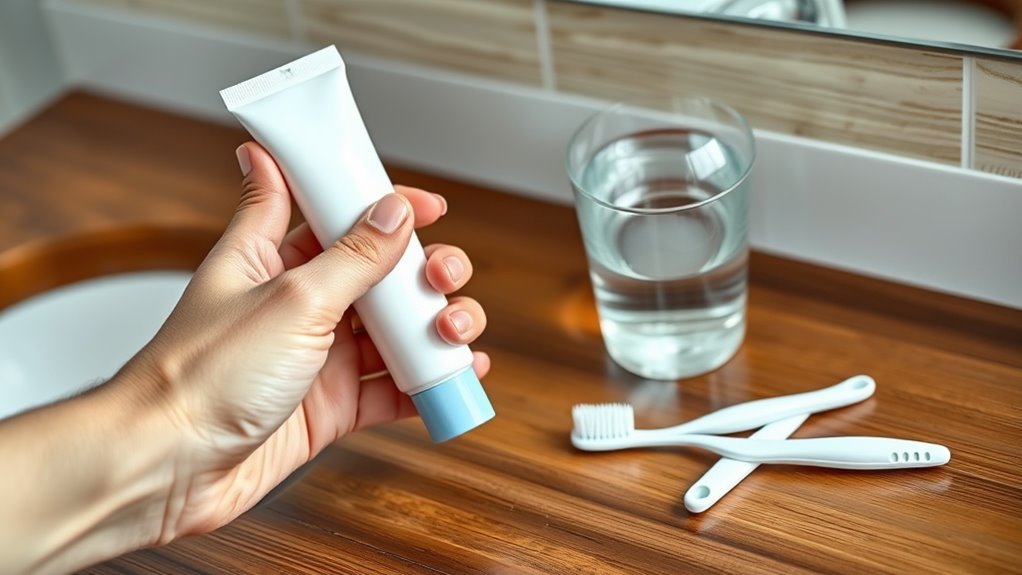
As you age, choosing the right toothpaste becomes essential for maintaining healthy, comfortable gums. Look for options with natural ingredients like aloe vera or chamomile, which soothe sensitive tissue. Avoid toothpastes with harsh abrasives that can irritate mature gums. Instead, select a formula with moderate fluoride content to help strengthen enamel and prevent decay, but not so high that it causes sensitivity. Many toothpastes designed for mature gums also contain ingredients like triclosan or zinc, which combat bacteria and reduce inflammation. Reading labels carefully guarantees you pick a product tailored to your needs. Additionally, understanding dental health statistics can help you track any related purchases of dental products or treatments. Being aware of cheating trends and behaviors can also encourage honest communication about health routines with loved ones. Remember, a gentle, effective toothpaste suited for your gum health supports your overall oral hygiene routine and helps you maintain a confident smile well into later years.
Incorporating Mouthwash Into Your Routine
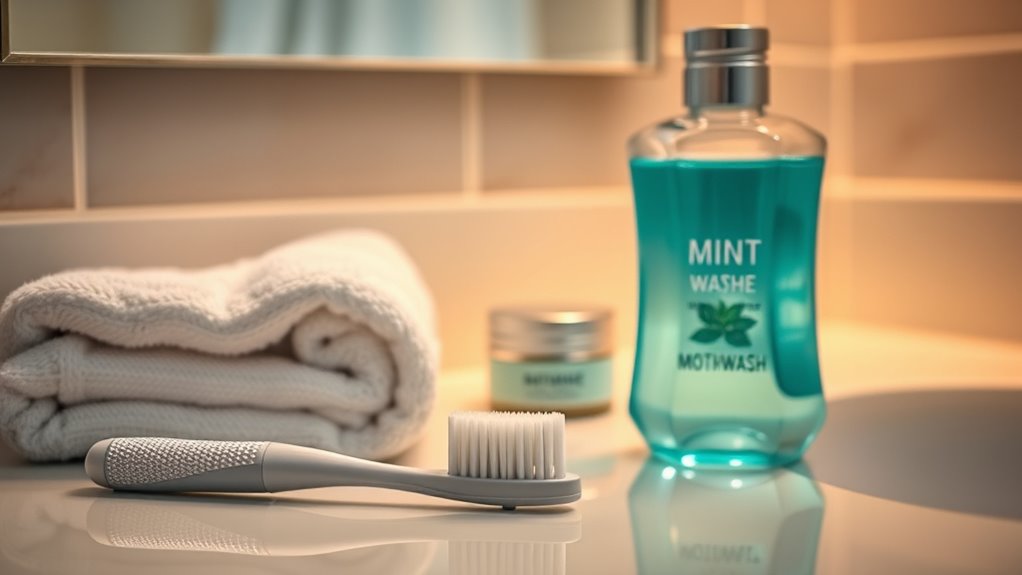
Incorporating mouthwash into your oral hygiene routine can provide extra protection against bacteria and help maintain fresh breath. The mouthwash benefits include reducing plaque, fighting germs, and freshening your mouth between brushings. When choosing mouthwash, look for options that target your specific needs, like alcohol-free formulas if you have sensitivity or added fluoride for cavity protection. Using mouthwash consistently can boost your overall oral health and complement brushing and flossing efforts. Additionally, selecting mouthwash with natural ingredients or essential oils can enhance antimicrobial effects safety precautions, ensuring a gentle yet effective rinse. Incorporating antimicrobial properties from essential oils can further improve oral freshness and health. Incorporating oral microbiome health into your routine can help maintain a balanced and healthy mouth environment.
Managing Dry Mouth and Sensitivity

After enhancing your oral hygiene routine with mouthwash, it’s important to address common issues like dry mouth and sensitivity, especially as you age. Dry mouth occurs when saliva production decreases, making your mouth feel uncomfortable and increasing decay risk. Using saliva substitutes can provide relief by mimicking natural saliva, keeping your mouth moist. For sensitivity, desensitizing agents help block nerve signals, reducing discomfort when eating or drinking hot, cold, or sweet foods. Incorporate these products into your daily routine as recommended by your dentist. Staying hydrated also helps maintain saliva flow. Understanding toilet maintenance and proper disposal habits can prevent issues that might contribute to oral health problems. If dryness or sensitivity persists, consult your dentist for tailored solutions. Managing these issues effectively keeps your mouth healthy, comfortable, and protected as you age.
Regular Dental Check-Ups and Professional Cleanings
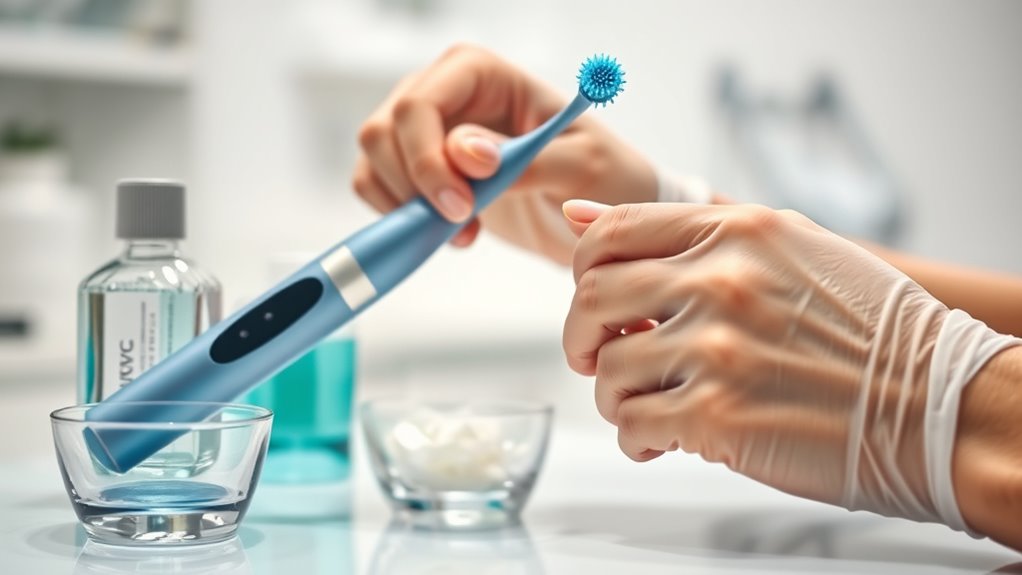
Regular dental check-ups and professional cleanings are essential for maintaining oral health as you age. They help catch issues early, prevent dental emergencies, and keep your smile bright. Staying consistent with these visits ensures that your dental insurance benefits are utilized effectively. During appointments, your dentist will remove plaque and tartar, check for signs of gum disease, cavities, or other concerns that become more common after 40. Regular visits also provide an opportunity to discuss any sensitivities or dry mouth issues. Incorporating preventive care into your routine can further enhance your oral hygiene routine between visits. Additionally, choosing appropriate dental products tailored for mature teeth can help maintain your oral health effectively. Using specialized dental tools can make cleaning more effective and comfortable. Remember, neglecting routine care can lead to more serious problems requiring extensive treatment. Schedule your check-ups at least twice a year to stay ahead of potential problems and keep your oral health in top shape.
Tips for Preventing and Managing Cavities
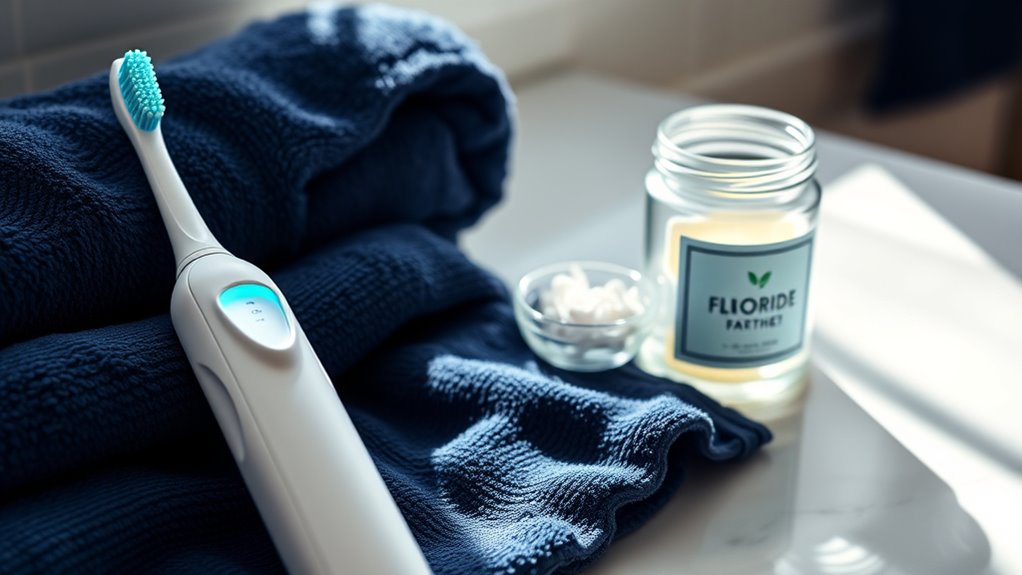
Regular dental checkups are essential for catching cavities early and keeping your mouth healthy. Using proper brushing techniques, like gentle circular motions and brushing for two minutes, helps remove plaque effectively. By staying consistent with these habits, you can considerably reduce your risk of cavities. Incorporating innovative dental tools and AI-powered diagnostics can further enhance your oral health management technological advancements.
Regular Dental Checkups
Scheduling dental checkups every six months is essential for catching cavities early and keeping your smile healthy. Regular visits allow your dentist to monitor your oral health, identify issues like decay or early gum disease, and recommend treatments like dental implants or orthodontic options if needed. During these visits, your dentist can also provide personalized advice to prevent future cavities.
- Get professional cleanings to remove plaque buildup
- Discuss any dental concerns, including restoration options
- Ensure your bite is properly aligned with orthodontic solutions
- Address minor issues before they become costly problems
Consistent checkups help you stay ahead of dental issues and maintain ideal oral health after 40. Don’t wait for problems to arise—regular visits are your best defense against cavities and other dental concerns.
Proper Brushing Techniques
Maintaining good oral hygiene involves more than just visiting the dentist; how you brush your teeth plays a key role in preventing cavities and keeping your smile healthy after 40. Use a soft-bristled toothbrush and gentle circular motions to clean every surface of your teeth. Don’t forget to clean your tongue daily to remove bacteria that cause bad breath and plaque buildup. Proper technique also includes rinsing with mouth rinses that contain fluoride, which strengthens enamel and fights decay. Avoid aggressive brushing, as it can damage gums and enamel. Regularly replace your toothbrush every three months. Combining thorough brushing, tongue cleaning, and mouth rinses helps reduce cavity risk and promotes overall oral health as you age.
Maintaining a Healthy Diet for Dental Health
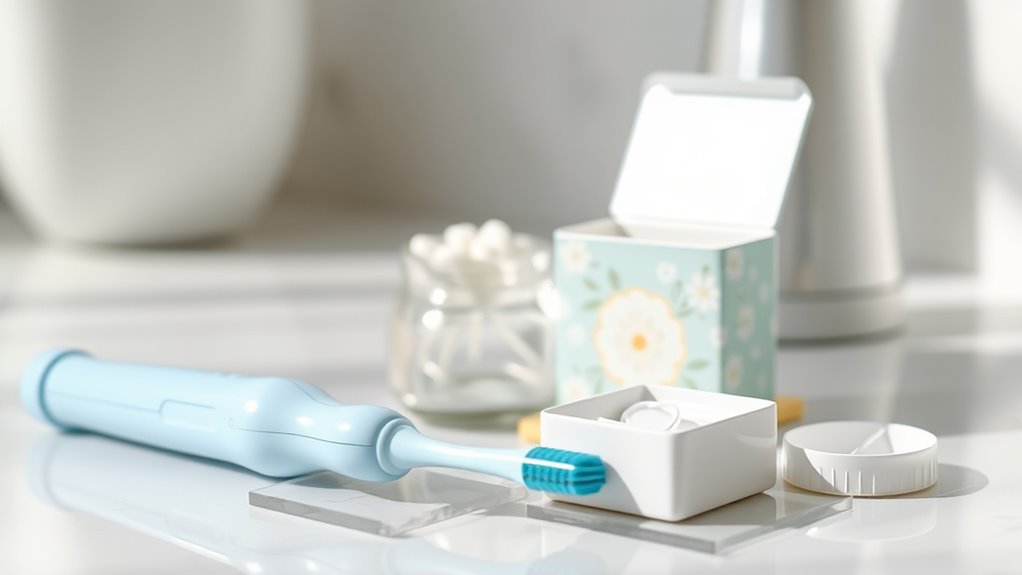
As you age, paying attention to your diet becomes crucial for supporting dental health. Consuming nutrient-rich foods helps strengthen teeth and gums, reducing the risk of decay and periodontal issues. Focus on balanced meal planning to include plenty of fruits, vegetables, lean proteins, and dairy products, which provide essential vitamins and minerals. Avoid excessive sugar and processed foods that can lead to cavities and erosion. Incorporate foods high in calcium and vitamin D to maintain strong enamel and bone support. Remember, what you eat directly impacts your oral health, so making mindful choices can keep your smile healthy and bright. Prioritize nutrient-dense options for long-term dental wellness and overall robustness.
Lifestyle Habits for a Bright, Healthy Smile
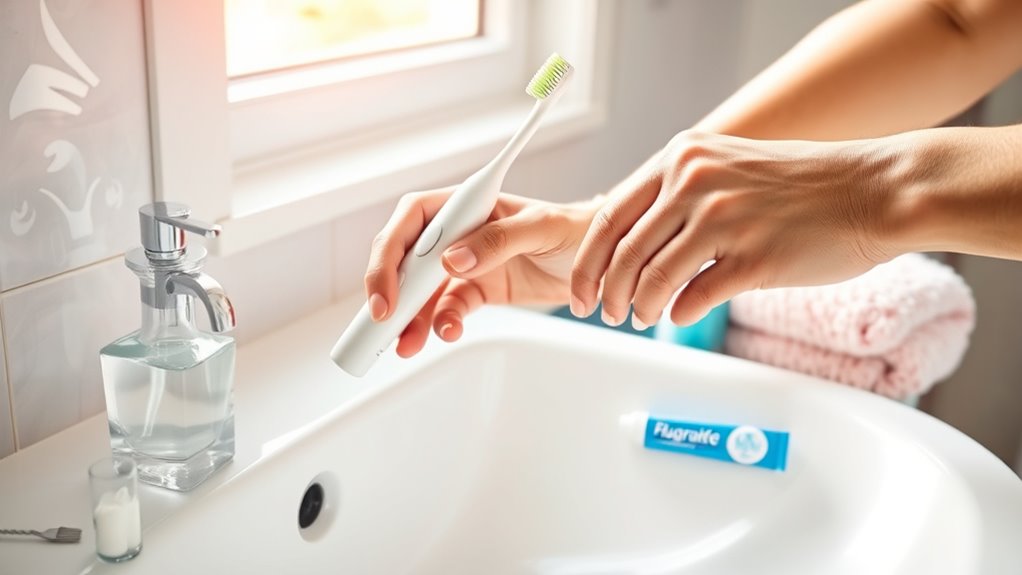
Adopting healthy lifestyle habits is essential for maintaining a bright and healthy smile as you age. Many believe oral health myths, like brushing harder cleans better, but gentle brushing with proper technique is key. Staying current with dental technology advances can markedly improve your oral care routine, offering more effective cleanings and early detection of issues. Avoid smoking and limit sugary drinks, which damage enamel and promote decay. Regular exercise and a balanced diet support overall health, including your teeth and gums. Managing stress reduces teeth grinding and gum issues. Consistent flossing, professional checkups, and staying informed about dental innovations help you maintain a vibrant smile well into your later years. These habits, combined with awareness of oral health myths, keep your smile healthy and bright.
Frequently Asked Questions
How Can I Prevent Gum Recession After 40?
To prevent gum recession, you should maintain good oral habits. Regularly floss daily to remove plaque between teeth and reduce gum irritation. Use mouth rinses with fluoride or antimicrobial properties to fight bacteria and strengthen your gums. Avoid aggressive brushing, which can damage gum tissue. Schedule regular dental checkups for professional cleanings and early detection. These steps help keep your gums healthy and prevent recession over time.
What Are Signs of Oral Health Issues in Older Adults?
If you ignore your oral health, it’s like inviting chaos—gingivitis symptoms like bleeding gums and persistent bad breath can take over, and dry mouth might turn your smile into a desert. You’ll notice red, swollen gums, or even loose teeth if issues worsen. Don’t overlook these signs; they’re your body’s way of warning you that something’s wrong. Regular check-ups and good hygiene keep these problems at bay.
Are Natural Remedies Effective for Oral Health Concerns?
Natural remedies like herbal mouthwash and oil pulling can support your oral health, but they shouldn’t replace regular dental care. Herbal mouthwash can freshen your breath and reduce bacteria, while oil pulling may help remove toxins and plaque. However, their effectiveness varies, and scientific evidence is limited. Use these remedies as supplemental practices alongside brushing, flossing, and professional check-ups for ideal oral health.
How Does Aging Affect Enamel Strength?
Aging causes your enamel to weaken, making it more prone to erosion and mineral loss. As you get older, your enamel becomes less dense, reducing its ability to protect your teeth from acids and sugars. This weakening process increases the risk of cavities and sensitivity. To maintain enamel strength, you should practice good oral hygiene, avoid acidic foods, and visit your dentist regularly for check-ups.
What Products Help Reduce Tooth Sensitivity?
You can reduce tooth sensitivity by choosing toothpaste with specific ingredients like potassium nitrate or stannous fluoride, which act as desensitizing agents. These ingredients help block the nerve signals that cause discomfort. Look for products labeled for sensitivity, and use them regularly. Avoid acidic foods and brushing too hard. Consistent use of such toothpaste provides relief and helps protect your enamel, especially as it weakens with age.
Conclusion
Taking good care of your teeth after 40 is essential—did you know that nearly 70% of adults over 40 experience some form of gum disease? By choosing the right tools, staying consistent with your routine, and visiting your dentist regularly, you can keep your smile healthy and bright for years to come. Remember, small daily habits make a big difference in maintaining your oral health and confidence.
